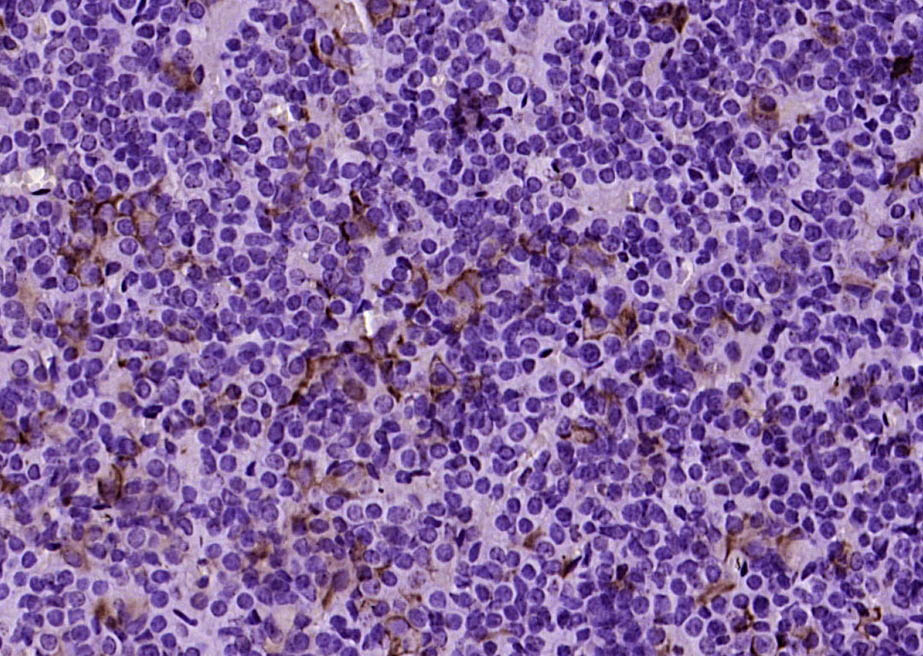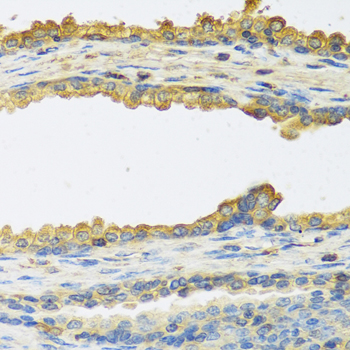![Thyroid Stimulating Hormone, beta (TSH beta) (Pituitary Marker)(TSHb/1317), CF405S conjugate, 0.1mg/mL [26628-22-8] Thyroid Stimulating Hormone, beta (TSH beta) (Pituitary Marker)(TSHb/1317), CF405S conjugate, 0.1mg/mL [26628-22-8]](https://biotium.com/wp-content/uploads/2021/02/view_image-894.jpeg)
Thyroid Stimulating Hormone, beta (TSH beta) (Pituitary Marker)(TSHb/1317), CF405S conjugate, 0.1mg/mL [26628-22-8]
BNC041317
ApplicationsImmunoHistoChemistry, ImmunoHistoChemistry Paraffin
Product group Antibodies
TargetTSHB
Overview
- SupplierBiotium
- Product NameThyroid Stimulating Hormone, beta (TSH beta) (Pituitary Marker)(TSHb/1317), CF405S conjugate, 0.1mg/mL [26628-22-8]
- Delivery Days Customer9
- ApplicationsImmunoHistoChemistry, ImmunoHistoChemistry Paraffin
- CertificationResearch Use Only
- ClonalityMonoclonal
- Clone IDTSHb/1317
- Concentration0.1 mg/ml
- ConjugateOther Conjugate
- Gene ID7252
- Target nameTSHB
- Target descriptionthyroid stimulating hormone subunit beta
- Target synonymsTSH-B, TSH-BETA, thyrotropin subunit beta, thyroid stimulating hormone beta, thyrotropin beta chain
- HostMouse
- IsotypeIgG1
- Protein IDP01222
- Protein NameThyrotropin subunit beta
- Scientific DescriptionThe four human glycoprotein hormones chorionic gonadotropin (CG), luteinizing hormone (LH) follicle stimulating hormone (FSH), and thyroid stimulating hormone (TSH) are dimers consisting of alpha and beta subunits that are associated non-covalently. The alpha subunits of these hormones are identical, however, their beta chains are unique and confer biological specificity. TSH is synthesized and secreted by thyrotrope cells in the anterior pituitary gland which regulates the endocrine function of the thyroid gland. TSH stimulates the thyroid gland to secrete the hormones thyroxine (T4) and triiodothyronine (T3). TSH production is controlled by a Thyrotropin-Releasing Hormone (TRH), which is manufactured in the hypothalamus and transported to the pituitary gland, where it increases TSH production and release. Somatostatin is also produced by the hypothalamus and has an opposite effect on the pituitary production of TSH, decreasing or inhibiting its release. TSH is a useful marker in classification of pituitary tumors and the study of pituitary disease. Primary antibodies are available purified, or with a selection of fluorescent CF® Dyes and other labels. CF® Dyes offer exceptional brightness and photostability. Note: Conjugates of blue fluorescent dyes like CF®405S and CF®405M are not recommended for detecting low abundance targets, because blue dyes have lower fluorescence and can give higher non-specific background than other dye colors.
- SourceAnimal
- Storage Instruction2°C to 8°C
- UNSPSC12352203





